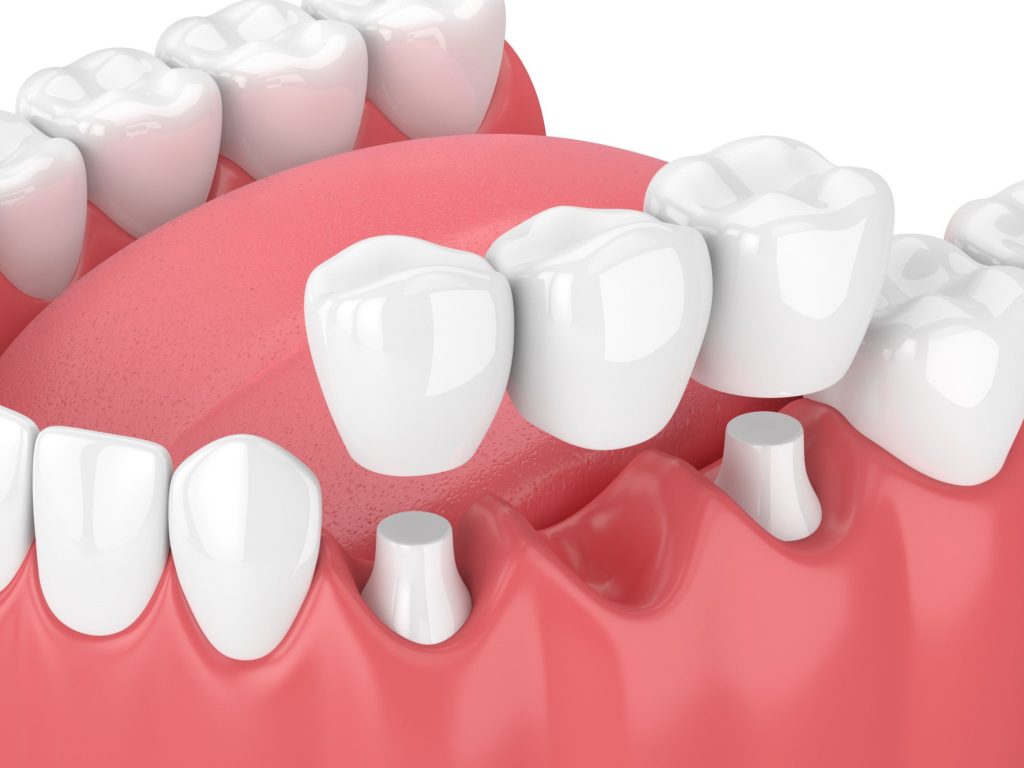If you have recently lost one or more of your teeth, you need to consider replacement options. Your teeth all work together as one unit. This means that when one is missing, the others will try to fill its place. If you do not replace your missing teeth, you risk significantly altering your bite pattern or losing more teeth.
There are several restorative solutions you and your dentist can discuss. However, some options may be more suited to your needs. If you prefer a minimally invasive procedure that provides a stable, long-lasting replacement, consider dental bridges.

What Are Dental Bridges?
Dentists use dental bridges to replace your missing teeth. They are false teeth that use “abutment” teeth to stay in place. Abutment teeth are the remaining natural teeth or dental implants that secure the pontic–false teeth. Literally, these devices “bridge” the gap between your missing teeth.
Dental bridges are typically made from porcelain to match your smile. However, they can be made from a variety of materials, including gold. There are four types of bridges that can help restore your smile. Which type of bridge depends on which teeth you are missing and where.
Traditional bridges use natural teeth on either side of the pontic, whereas cantilever bridges only need one abutment tooth. Implant-supported bridges use implants to support the bridge. Additionally, a Maryland bridge uses a metal or porcelain framework to keep the bridge in place compared to the use of dental crowns.
What Are The Benefits?
Dental bridges come with numerous benefits. Unlike dentures, dental bridges stay in place. You will not remove them daily for cleaning or sleeping. Only a dental professional will remove them during professional cleanings. This allows you the freedom to live your life without constantly worrying about your teeth. Additionally, dental bridges can last up to 10 years with proper care and attention, meaning you shouldn’t need constant dental work.
Prevents Teeth from Shifting
When you get dental bridges, you fill the gap created by your missing teeth. This can prevent your remaining teeth from shifting. Shifting teeth can cause several problems, including a bad bite, loose teeth, trouble chewing, and even more missing teeth.
Improves Eating
When you lose teeth, it becomes difficult to eat or chew. Certain foods can be nearly impossible to eat, or they can cause discomfort. However, dental bridges will restore the function of your teeth, making chewing easier.
Improves Speech
Missing teeth can affect your speech. As you speak, your tongue hits certain parts of your teeth and the roof of your mouth. When you have teeth missing, it alters your ability to make certain sounds. This means that you can develop a lisp or other speech difficulties due to missing teeth. However, dental bridges will fix some speech issues.
Restores Smile
Above all, dental bridges can restore the look of your smile. Dental bridges will blend with your smile to look like natural teeth. Additionally, you can look forward to a minimally invasive procedure to get dental bridges. Unlike dental implants, you don’t have to undergo surgery.
